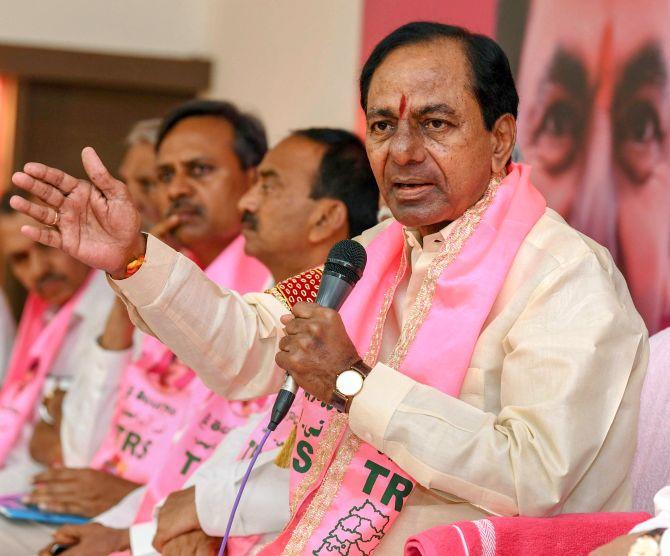Fortune favours the brave and K Chandrashekar Rao has done well by taking risks and winning it all, says Aditi Phadnis.

K Chandrashekhar Rao (popularly known as KCR) is chief minister of a state that was in 2018 rated number two for the ease of doing business in India.
Possibly on the back of that endorsement, he has proposed advancing the assembly polls from May next year to November this year. He is, clearly, a man who is not afraid of taking risks.
This pretty much sums up KCR. Fortune favours the brave and he has done well by taking risks and winning it all.
He was in the Telugu Desam Party and an MLA for four terms. In 1999, he was close to getting a ministership but was pipped to the post by a fellow Vellama, former Central Bureau of Investigation director Vijaya Rama Rao who had contested the 1999 election and became a first-time MLA.
KCR might not have taken up cudgels on behalf of Telangana if he had become a minister then.
Anyhow, he left the TDP to form the Telangana Rashtra Samiti in 2001, ostensibly to right the wrongs done to Telangana all these years.
It is a battle he fought hard and won. He has not looked back since then. Investment is flowing into Telangana. The capital, Hyderabad, already well-developed, has recovered from the setback of the Telangana movement.
Telangana has been backward for centuries. It never came under the British but was ruled by the Nizam of Hyderabad, who did set up a few factories and a textile mill in Warangal in collaboration with the French, but avenues of employment were few and exploitation abounded, something Shyam Benegal had captured eloquently in his film Ankur.
The most crucial infrastructure element -- irrigation system -- was never developed systematically in Telangana although both the Krishna and the Godavari flowed through it.
In contrast, the coastal Andhra region aggressively lobbied for and got a garland of canals that took river waters deep into East and West Godavari districts.
Nothing changed for Telangana over the years. The region became a stronghold of the Communist Party of India and armed struggle came to India first in Telangana.
In 1956, when the Fazal Ali Commission presented its report on the linguistic reorganisation of states, Telangana first refused to integrate and then negotiated too long and hard on the terms on which it would become part of Andhra Pradesh.
What Jawaharlal Nehru called a 'gentleman’s agreement' was drawn up -- that Telangana would be recognised as 'virtually' a separate state.
This did not happen for 50 years but the movement -- and feelings -- for a separate state continued to simmer.
In the summer of 2001, Andhra Pradesh had local body elections. The TRS took off so strongly that the TDP won just 10 of the 20 zilla parishads, despite a triangular fight -- among itself, the Congress and the TRS.
Realising its potential, the Congress quickly did a deal with the TRS for the Lok Sabha election.
KCR’s rallies proved an instant hit. In the 2004 Lok Sabha and assembly elections, which the TRS fought in alliance with Congress, the party had bagged 26 assembly and five Lok Sabha seats.
He kept petitioning the Congress to give statehood to Telangana. The Congress continued to prevaricate.
Finally, KCR pulled out of the coalition government, resigned as Union labour minister, and threatened to expose the Congress for betraying the people of Telangana.
As chief minister, KCR put in place a number of measures that may seem populist. He waived farm loans up to Rs 1,00,000 but these were broken up into four tranches.
He recently announced a scheme of Rythu Bandhu: Without getting involved in complicated agri-procurement subsidy schemes like the Bhavantar Bhugtan, he said Rs 8,000 per acre would be given to farmers in two phases to cover two sets of cropping seasons.
He also put in place a scheme to correct discrepancies in land records across Telangana. The net result is that KCR will likely coast to victory in Telangana.
He says the TRS is '100 per cent' secular and can never align with the Bharatiya Janata Party.
He also thinks he could never do a deal with a "buffoon’' like Congress president Rahul Gandhi. Further moves by him have to be watched carefully.












 © 2025
© 2025